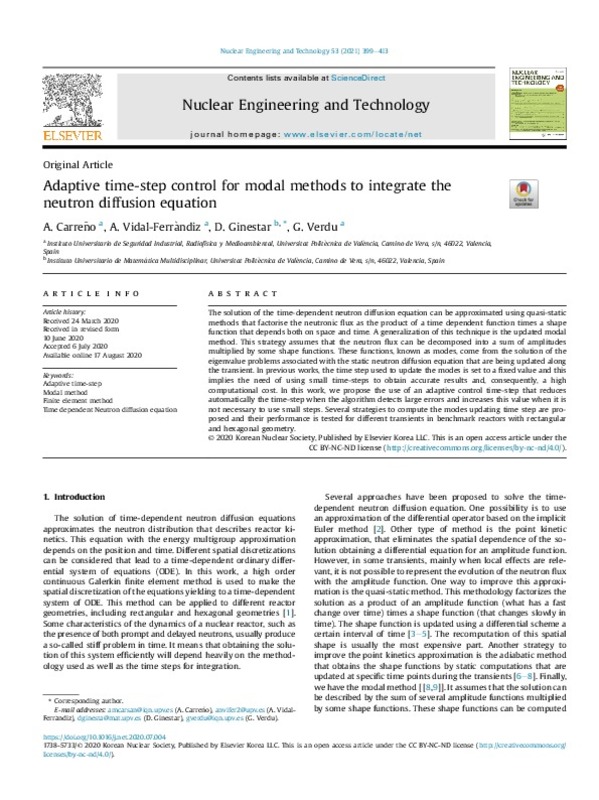JavaScript is disabled for your browser. Some features of this site may not work without it.
Buscar en RiuNet
Listar
Mi cuenta
Estadísticas
Ayuda RiuNet
Admin. UPV
Adaptive time-step control for modal methods to integrate the neutron diffusion equation
Mostrar el registro sencillo del ítem
Ficheros en el ítem
| dc.contributor.author | Carreño, Amanda
|
es_ES |
| dc.contributor.author | Vidal-Ferràndiz, Antoni
|
es_ES |
| dc.contributor.author | Ginestar Peiro, Damián
|
es_ES |
| dc.contributor.author | Verdú Martín, Gumersindo Jesús
|
es_ES |
| dc.date.accessioned | 2022-04-27T10:07:19Z | |
| dc.date.available | 2022-04-27T10:07:19Z | |
| dc.date.issued | 2021-02 | es_ES |
| dc.identifier.issn | 1738-5733 | es_ES |
| dc.identifier.uri | http://hdl.handle.net/10251/182189 | |
| dc.description.abstract | [EN] The solution of the time-dependent neutron diffusion equation can be approximated using quasi-static methods that factorise the neutronic flux as the product of a time dependent function times a shape function that depends both on space and time. A generalization of this technique is the updated modal method. This strategy assumes that the neutron flux can be decomposed into a sum of amplitudes multiplied by some shape functions. These functions, known as modes, come from the solution of the eigenvalue problems associated with the static neutron diffusion equation that are being updated along the transient. In previous works, the time step used to update the modes is set to a fixed value and this implies the need of using small time-steps to obtain accurate results and, consequently, a high computational cost. In this work, we propose the use of an adaptive control time-step that reduces automatically the time-step when the algorithm detects large errors and increases this value when it is not necessary to use small steps. Several strategies to compute the modes updating time step are proposed and their performance is tested for different transients in benchmark reactors with rectangular and hexagonal geometry. | es_ES |
| dc.description.sponsorship | This work has been partially supported by Spanish Ministerio de Economia y Competitividad under projects ENE2017-89029-P and MTM2017-85669-P and financed with the help of a Primeros Proyectos de Investigacion (PAID-06-18) from Vicerrectorado de Investigacion, Innovacion y Transferencia of the Universitat Politecnica de Valencia. | es_ES |
| dc.language | Inglés | es_ES |
| dc.publisher | Elsevier | es_ES |
| dc.relation.ispartof | Nuclear Engineering and Technology | es_ES |
| dc.rights | Reconocimiento - No comercial - Sin obra derivada (by-nc-nd) | es_ES |
| dc.subject | Adaptive Time-Step | es_ES |
| dc.subject | Modal Method | es_ES |
| dc.subject | Finite Element Method | es_ES |
| dc.subject | Time Dependent Neutron Diffusion Equation | es_ES |
| dc.subject.classification | MATEMATICA APLICADA | es_ES |
| dc.subject.classification | INGENIERIA NUCLEAR | es_ES |
| dc.title | Adaptive time-step control for modal methods to integrate the neutron diffusion equation | es_ES |
| dc.type | Artículo | es_ES |
| dc.identifier.doi | 10.1016/j.net.2020.07.004 | es_ES |
| dc.relation.projectID | info:eu-repo/grantAgreement/AEI/Plan Estatal de Investigación Científica y Técnica y de Innovación 2013-2016/ENE2017-89029-P/ES/VERIFICACION, VALIDACION CUANTIFICACION DE INCERTIDUMBRES Y MEJORA DE LA PLATAFORMA NEUTRONICA%2FTERMOHIDRAULICA PANTHER/ | es_ES |
| dc.relation.projectID | info:eu-repo/grantAgreement/UPV//PAID-06-18/ | es_ES |
| dc.relation.projectID | info:eu-repo/grantAgreement/AEI/Plan Estatal de Investigación Científica y Técnica y de Innovación 2013-2016/MTM2017-85669-P/ES/PROBLEMAS MATRICIALES: COMPUTACION, TEORIA Y APLICACIONES/ | es_ES |
| dc.relation.projectID | info:eu-repo/grantAgreement/UPV-VIN//SP20180095//Aproximaciones de alto orden para la ecuación del transporte neutrónico/ | es_ES |
| dc.rights.accessRights | Abierto | es_ES |
| dc.contributor.affiliation | Universitat Politècnica de València. Departamento de Ingeniería Química y Nuclear - Departament d'Enginyeria Química i Nuclear | es_ES |
| dc.contributor.affiliation | Universitat Politècnica de València. Departamento de Matemática Aplicada - Departament de Matemàtica Aplicada | es_ES |
| dc.description.bibliographicCitation | Carreño, A.; Vidal-Ferràndiz, A.; Ginestar Peiro, D.; Verdú Martín, GJ. (2021). Adaptive time-step control for modal methods to integrate the neutron diffusion equation. Nuclear Engineering and Technology. 53(2):399-413. https://doi.org/10.1016/j.net.2020.07.004 | es_ES |
| dc.description.accrualMethod | S | es_ES |
| dc.relation.publisherversion | https://doi.org/10.1016/j.net.2020.07.004 | es_ES |
| dc.description.upvformatpinicio | 399 | es_ES |
| dc.description.upvformatpfin | 413 | es_ES |
| dc.type.version | info:eu-repo/semantics/publishedVersion | es_ES |
| dc.description.volume | 53 | es_ES |
| dc.description.issue | 2 | es_ES |
| dc.relation.pasarela | S\417217 | es_ES |
| dc.contributor.funder | AGENCIA ESTATAL DE INVESTIGACION | es_ES |
| dc.contributor.funder | UNIVERSIDAD POLITECNICA DE VALENCIA | es_ES |
| dc.contributor.funder | Universitat Politècnica de València | es_ES |
| upv.costeAPC | 1573 | es_ES |








